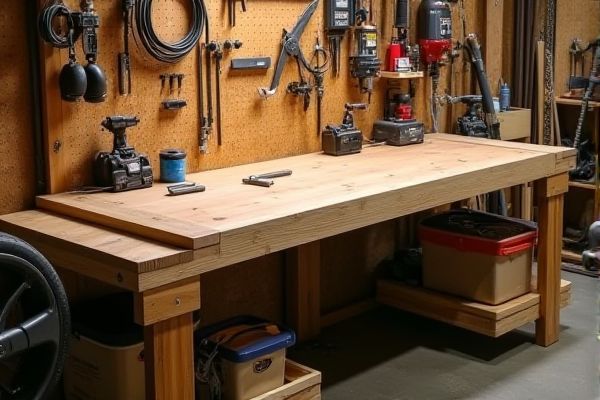
A folding workbench offers portability and space-saving benefits, ideal for flexible work environments, while a fixed workbench provides superior stability and durability for heavy-duty tasks. Discover which type best suits Your needs by exploring the detailed comparison in the rest of the article.
Table of Comparison
| Feature | Folding Workbench | Fixed Workbench |
|---|---|---|
| Portability | High - Easy to fold and transport | Low - Stationary and heavy |
| Space Efficiency | Compact when folded | Requires permanent space |
| Stability | Moderate - May wobble under heavy load | High - Stable for heavy-duty tasks |
| Setup Time | Quick - Folds/unfolds easily | None - Always ready |
| Durability | Generally less durable due to moving parts | Highly durable and built to last |
| Cost | Typically affordable | Usually more expensive |
| Best Use Case | DIY projects, mobile tasks, small spaces | Professional workshops, heavy-duty work |
Introduction to Workbenches: Folding vs Fixed
Folding workbenches offer portability and space-saving functionality, making them ideal for small workshops or on-the-go projects. Fixed workbenches provide superior stability and durability, supporting heavy-duty tasks and long-term use. Choose a workbench based on your workspace size, project needs, and the importance of mobility for your tasks.
Key Differences Between Folding and Fixed Workbenches
Folding workbenches offer portability and space-saving features, making them ideal for small workshops or on-the-go projects, while fixed workbenches provide superior stability and durability suited for heavy-duty tasks. The key differences lie in their structural design: folding workbenches have hinges and lightweight materials for easy storage, whereas fixed workbenches feature solid frames and permanent installation for maximum strength. Your choice depends on the balance between mobility needs and the demand for a robust, stationary workspace.
Space Efficiency: Which Workbench Saves More Room?
A folding workbench significantly saves more room compared to a fixed workbench by collapsing flat against the wall when not in use, making it ideal for small spaces or garages. Fixed workbenches require a permanent footprint, consuming consistent floor space even if not actively used. If maximizing your available area is a priority, a folding workbench offers a flexible and space-efficient solution.
Portability: Folding Workbench Advantages
Folding workbenches offer superior portability due to their lightweight frames and compact foldable design, making them easy to transport and store. These workbenches often feature built-in handles and quick-release mechanisms, allowing users to set up or pack away efficiently on job sites or small workshops. Their space-saving functionality enhances usability in environments with limited room, providing versatile work surfaces without sacrificing convenience.
Stability and Durability: Fixed Workbench Benefits
Fixed workbenches provide superior stability due to their solid construction and permanent installation, making them ideal for heavy-duty tasks. Their durability stems from robust materials such as hardwood or metal, which withstand regular use and heavy loads over time. Unlike folding workbenches, fixed models offer a reliable, unwavering surface essential for precision work and long-term projects.
Weight Capacity Comparison
Folding workbenches typically offer weight capacities ranging from 100 to 500 pounds, making them suitable for lighter tasks and portability needs. Fixed workbenches generally support significantly higher weight capacities, often exceeding 1,000 pounds, due to their robust construction and permanent installation. Choosing between folding and fixed workbenches depends on the required load-bearing capacity and workspace flexibility.
Versatility and Usage Scenarios
Folding workbenches offer exceptional versatility by providing easy portability and quick setup, making them ideal for on-site projects and limited workspace environments. Fixed workbenches excel in durability and stability, supporting heavy-duty tasks and long-term use in dedicated workshop settings. Choosing between the two depends on prioritizing portability for versatile use or robust construction for consistent, heavy workloads.
Maintenance and Longevity
Folding workbenches require regular checks on hinges and locking mechanisms to maintain stability and prevent wear, while fixed workbenches offer greater durability due to their solid construction with fewer moving parts. Proper maintenance of your folding workbench can extend its lifespan, but fixed workbenches generally provide longer-lasting performance with minimal upkeep. Choosing a fixed workbench ensures enhanced longevity, especially in heavy-duty work environments where consistent strength is crucial.
Cost Analysis: Folding vs Fixed Workbenches
Folding workbenches typically offer lower upfront costs and save space, making them ideal for budget-conscious users with limited areas. Fixed workbenches generally involve higher initial expenses but provide superior durability and load capacity for heavy-duty tasks. Your choice depends on balancing cost efficiency with long-term stability and workspace requirements.
Choosing the Right Workbench for Your Needs
Selecting the ideal workbench depends on your workspace size, project types, and mobility requirements. Folding workbenches offer compact storage and portability, perfect for small areas or on-the-go tasks, while fixed workbenches provide enhanced stability and weight capacity suited for heavy-duty projects. Evaluating factors like durability, surface material, and setup frequency helps determine the best fit for your specific workshop needs.
 homyna.com
homyna.com